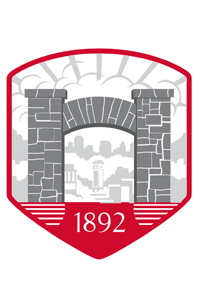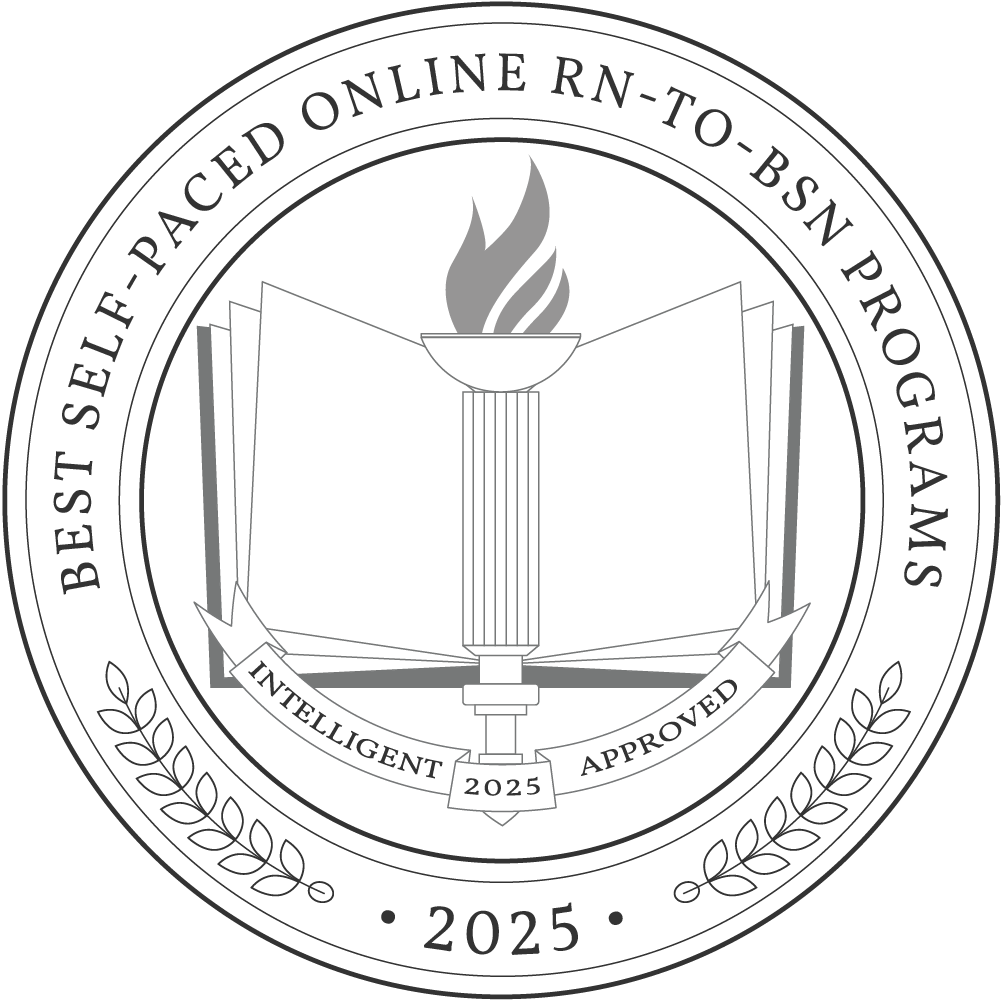In the rapidly changing world of healthcare, it is increasingly essential for registered nurses to consider continuing their education by earning a bachelor’s degree. RNs with a BSN degree earn a median pay of $77,600 annually and are in high demand at hospitals, clinics, and other care centers. In some circumstances, facilities will only accept bachelor-trained nurses for positions on their staff.
Earning your BSN degree online in a self-paced program can be one of the most flexible and effective ways for busy nurses to gain the education they need to advance in their field. In this article, we’ll look at the best RN-to-BSN online self-paced programs and discuss the factors you need to consider when looking for the program that suits you best.
Why Trust Us
The Intelligent.com Higher Education Team is dedicated to providing students with independent, equitable school and program rankings and well-researched resources. Our expert-driven articles cover topics related to online colleges and programs, paying for school, and career outlooks. We use data from the U.S. Department of Education’s College Scorecard, the National Center for Education Statistics, and other reputable educational and professional organizations. Our academic advisory team reviews content and verifies accuracy throughout the year for the most current information. Partnerships do not influence rankings or editorial decisions.
- Analyzed over 2,000 national, accredited, and nonprofit colleges and universities
- 800+ rankings pages are reviewed and updated yearly
- Content is informed by reputable sources, surveys, and interviews with academic advisors and other experts
- Over 100 data points are reviewed for accuracy and quality throughout the year, including sources
How we rank schools
Our list features the best Self-Paced Online RN-to-BSN degree programs at top colleges nationwide. Each school featured is a nonprofit, accredited institution — either public or private — with a high standard of academic quality for post-secondary institutions.
We evaluated each school’s program on tuition costs, admission, retention and graduation rates, faculty, reputation, and the student resources provided for online students. We collected data from trusted sources like the National Center for Education Statistics, individual school and program websites, school admissions counselors, and other data sources. Then, we calculated the Intelligent Score on a scale of 0 to 100 based on the following criterion:
Academic Quality:
- Admission rate versus enrollment rate
- Retention rate of students who return after year one
- Accreditation status (regional and programmatic)
- Nonprofit status, both private and public institutions
Graduation Rate
- Overall graduation rate
- Total number of currently enrolled students, including diversity metrics
- Student-to-faculty ratio
Cost and ROI
- In-state and out-of-state per-credit tuition rates and fees
- Required credits to graduate
- Earning potential after graduation
- Availability of federal student loans, scholarships, and other financial aid options
Student Resources
- Available student services for online-only and hybrid programs
- On-campus amenities like tutoring centers and the number of libraries
Read more about our ranking methodology.
Best 5 Online RN to BSN Self-Paced Programs
FiltersInstitution Type
Status
- Intelligent Score
- Alphabetically By University Name
- Acceptance Rate
- Enrollment
- In-state Graduate Tuition
- Out-of-state Graduate Tuition
- In-state Undergraduate Tuition
- Out-of-state Undergraduate Tuition

University of Toledo
Intelligent Score: 99.9In-state: $8,736
Out-of-state: $18,096
In-state: $14,398
Out-of-state: $14,398
SAT: 985-1210
ACT: 20-26
$335
Online
Commission on Collegiate Nursing Education
120

Lourdes University
Intelligent Score: 98.79In-state: $23,600
Out-of-state: $23,600
In-state: $13,561
Out-of-state: $13,561
SAT: 850-1080
ACT: 17-23
$860
Online
Commission on Collegiate Nursing Education
120

Winston-Salem State University
Intelligent Score: 97.15In-state: $20,406
Out-of-state: $31,062
In-state: $20,877
Out-of-state: $20,877
SAT: 880-1040
ACT: 15-19
In-State: $114
Out-of-State: $474
Online
Commission on Collegiate Nursing Education
128.0

The University of Texas Permian Basin
Intelligent Score: 91.96In-state: $11,448
Out-of-state: $40,032
In-state: $12,028
Out-of-state: $12,028
SAT: 1210-1470
ACT: 26-33
$362
Online
Commission on Collegiate Nursing Education
120

University of Louisiana Monroe
Intelligent Score: 90.34In-state: $5,407
Out-of-state: $19,135
In-state: $5,511
Out-of-state: $5,511
SAT: 1000-1210
ACT: 20-26
$200
Online
Commission on Collegiate Nursing Education
120
What Can You Expect from an Online RN-to-BSN Degree Program
RN-to-BSN programs are designed for RNs who have passed their National Council Licensure Examination (NCLEX) for nursing licensure and want to earn a Bachelor of Science in Nursing (BSN) to increase job opportunities and earning potential.
Because these programs allow students to transfer credits from their previous post-secondary experiences, they can often be completed in a shorter timeframe than traditional BSN programs. However, because self-paced programs allow students to complete their courses according to their own schedule, the amount of time it takes to earn this degree will vary by student.
Students in self-paced programs complete courses asynchronously, which means there are no scheduled class meetings. Lessons and assignments are available 24/7, although some programs or courses may have specific deadlines for turning in schoolwork. Coursework typically covers research, health promotion, patient care technology, safety and quality within the healthcare system, and advanced clinical skills.
Even if coursework can be completed online at the student’s own pace, these programs typically require clinical internships that students must complete in person. Students should inquire with a program representative or admissions counselor to get more specific information about clinical requirements from the programs they’re considering to ensure they accommodate those components in their schedules.
Pros and cons of a self-paced RN-to-BSN degree program
Self-paced degree programs allow you a certain amount of flexibility in when and how you do your coursework. As the name suggests, with a self-paced program, you attend classes at the time that works best for you, which makes these programs an excellent choice for nurses with busy working schedules and those with family or other commitments.
Your school may include some restrictions: you may have, for example, three more weeks to complete your work than regular students. It’s worth noting that self-paced programs include deadlines; they tend to be more flexible than usual.
Below are some pros and cons when deciding if a self-paced online RN-to-BSN program is right for you.
Pros
Cons
Potential courses you’ll take in a self-paced online RN-to-BSN degree program
- Nursing Health Assessment: Provides the knowledge, skills, tools, techniques, and attitudes for competency that professional nurses need to perform comprehensive health history, physical, and psychosocial assessments.
- Research and Evidence-Based Practice in Nursing: This course focuses on the knowledge, skills, and attitudes required for the research process, including evaluating and disseminating best practices to improve healthcare outcomes. It also provides an overview of how scientific evidence can be integrated into nursing practices.
- Ethics, Legalities, and Advocacy: This course explores various ethical guidelines that inform and guide nurses’ decision-making, including the framework of the American Nurses Association Code of Ethics. It emphasizes the knowledge, skills, and attitudes included in nurses’ legal and ethical responsibilities in all aspects of care.
- Leadership and Management: This program provides the opportunity to develop the knowledge, skills, and attitudes required for leadership and management in nursing, with emphasis on conflict management, workplace diversity, resource allocation, quality, and performance.
What Can I Do With an Online RN-to-BSN Degree?
When RNs with an associate degree or diploma earn a BSN, they create opportunities to move into more specialized roles within the healthcare field. They can also command a higher salary, thanks to their additional knowledge and experience.
Enrolling in a self-paced online RN-to-BSN degree program allows students to learn more advanced clinical skills and focus on an area of nursing practice that interests them. Popular concentrations within nursing include pediatrics, geriatrics, neonatal care, psychiatric nursing, cardiology, oncology, and obstetrics and gynecology.
Once students have their BSN, they’re well-positioned to pursue further education, such as a Master of Science in Nursing (MSN), which will allow them to become advanced practice registered nurses (APRN). These individuals have a greater scope of practice than RNs, including the ability to diagnose medical issues and prescribe medication. They can also pursue specializations in anesthesiology or midwifery.
Career outlook
- Registered nurses — Work as part of a team with physicians and other healthcare specialists to provide and coordinate patient care, educate patients and the public about various health conditions, and provide advice and emotional support to patients and their families.
- Median annual salary: $86,070
- Projected employment growth (through 2032): 6%
- New jobs projected: 193,100 per year
- Health education specialists — Teach people about behaviors that promote wellness, including developing strategies to improve the well-being of individuals and communities.
- Median annual salary: $62,860
- Projected employment growth (through 2032): 7%
- New jobs projected: 6,600 per year
- Nurse practitioners — Coordinate patient care and may provide primary and specialty healthcare, with the scope of practice varying from state to state.
- Median annual salary: $129,480
- Projected employment growth (through 2032): 38%
- New jobs projected: 29,200 per year
How to Choose a Self-Paced Online RN-to-BSN Degree Program That’s Right For You
Consider your needs and goals
To find the self-paced online RN-to-BSN program that’s right for you, it’s helpful to clarify what you need from the program. Consider your career goals, including the type of nursing jobs you want to qualify for, so you can find a program that will give you the necessary skills and experiences. Decide if you want to pursue a nursing specialization, such as psychiatric nursing, neonatal care, cardiology, oncology, or pediatrics, as this will help you narrow your search to programs that offer your desired concentration.
Now is also a good time to think about your logistical needs. How much time do you realistically have to dedicate to classes and homework each week? How do you learn best? Most self-paced online programs are delivered asynchronously, so students don’t have regularly scheduled classes. However, even within asynchronous programs, there may be various levels of interaction between faculty and classmates. If you’re a student who learns better through discussions and hands-on projects, seek out programs that offer this type of instruction.
Research schools and programs
Once you’ve established your parameters for the type of program you want, you can search for programs that align with your needs and goals.
Many universities provide information about curriculum, learning format, admissions requirements, faculty, cost, and financial aid on their websites. You can also contact the admissions department directly or attend a virtual open house or information session with additional questions.
Some important information to gather while researching schools includes:
- The school’s and program’s accreditation status: Check to ensure the university is accredited by agencies recognized by the U.S. Department of Education. Proper accreditation directly affects the quality of education you’ll receive, your eligibility for financial aid, graduate programs you can apply for, and job opportunities after graduation. The program should also be accredited by industry-specific organizations such as the Accreditation Commission for Education in Nursing and the Commission on Collegiate Nursing Education.
- Program cost and available financial aid: A key way to determine if a program is right for you is ensuring it fits your budget. Find out what the per-term tuition cost is and what, if any, additional fees the school charges. Speak to a financial counselor about available financial aid options, so you have a clear picture of what the program will cost you out-of-pocket.
- Clinical requirements: Even if you can complete all coursework for your RN-to-BSN online, the program will most likely have a clinical rotation requirement that students must complete in person. Find out the specific clinical requirements for the programs you’re considering, and determine how you can accommodate those requirements in your schedule before selecting a program.
Review application and eligibility requirements
Another factor that can help you determine which program is right for you is admissions requirements and eligibility criteria. Review this information on the school’s website and contact an admissions counselor if you have questions.
RN-to-BSN degree programs require that students have an associate degree in nursing and an active, unencumbered nursing license. Some programs may also require that students have a valid nursing license in the state where the school is located. Students who don’t have an RN license and previous education experience in nursing can seek out a traditional four-year BSN program.
Other eligibility criteria may include a minimum GPA requirement, prerequisite coursework, or a minimum number of years of professional experience.
Be sure to check the deadlines for submitting applications and supporting documents. Some schools offer rolling admissions, while others only accept new students during one or more dates throughout the year.
Determine how you’ll pay for your degree
There are many options available to students who are earning their BSN degree. If you plan on working while attending school, consult your employer about tuition assistance benefits. Because a BSN gives students so many in-demand skills, employers are willing to help students financially by obtaining this degree.
You must submit the Free Application for Federal Student Aid (FAFSA) to access federal student aid, such as student loans and grants. Colleges use the information from this application to determine eligibility for federal and institutional need-based aid.
Using financial aid that doesn’t need to be repaid, like scholarships and grants, is ideal whenever possible. Most schools and many external organizations, including professional associations, nonprofits, and community and religious groups, award this kind of financial aid.
Many schools offer payment plans that allow students to spread tuition payments out over the term, as well as military discounts for veterans and active-duty service members.
Self-Paced Online RN-to-BSN Degree Program Frequently Asked Questions
How do I apply to a self-paced online RN-to-BSN degree program?
For online programs, students typically submit applications and supporting materials electronically via the school’s website. Students must typically submit proof of their nursing license and transcripts from their previous education as part of the application process. This way, schools can confirm that prospective students have the necessary professional and educational experience to succeed in the program.
Other materials that students will likely be required to submit include:
How much does a self-paced online RN-to-BSN degree program cost?
According to the National Center for Education Statistics (NCES), the average annual undergraduate tuition during the 2022-23 academic year was $27,673.
However, the cost of an online RN-to-BSN program will vary based on factors like whether the school you’re attending is public or private and if you reside in the state where the school is located. Public universities may charge different tuition rates for in-state and out-of-state students, although some schools charge the same tuition for all online students. Additional expenses include technology and software needed for online study, supplies, and books. However, online students can save money on transportation, childcare, and room-and-board fees.
For the most specific information about the cost of a self-paced online RN-to-BSN degree program, consult a financial aid counselor at the schools you’re considering.
How long does it take to earn a self-paced online RN-to-BSN degree?
The duration of self-paced programs depends primarily on the individual student since they complete coursework according to their own schedule. However, students enrolling in self-paced programs should note that most programs have a limit on how long students have to complete all graduation requirements.
The number of credits a student must complete to earn their BSN will also impact the duration of the program. Students with an associate degree in nursing will likely have a maximum of 60 credits to apply to their BSN, which requires 120 credits. Students enrolled in an RN-to-BSN will likely take 2-3 years to complete the final 60 credits for their bachelor’s degree.
Is a self-paced online RN-to-BSN degree worth it?
With an estimated 1.8 million job openings expected annually through 2032, healthcare is one of the fastest-growing fields in the U.S. Earning a BSN degree can help RNs stay competitive and command higher salaries when seeking opportunities. The American Nurses Association reports that the average annual salary for nurses with a BSN is $92,000, compared to $75,000 for those with an ADN.
While all BSN degree programs include an in-person component to fulfill clinical rotation requirements, completing the coursework for this program online can make it more accessible, especially for RNs who work while in school.

